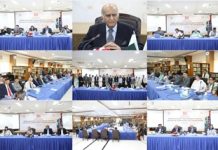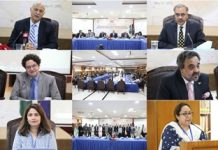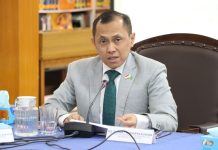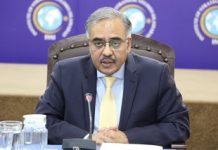Foreign Secretary’s Speech at the Concluding Session of the One Day International Conference “Celebrating Pakistan’s Ancient Archaeological and Civilizational Heritage” at ISSI
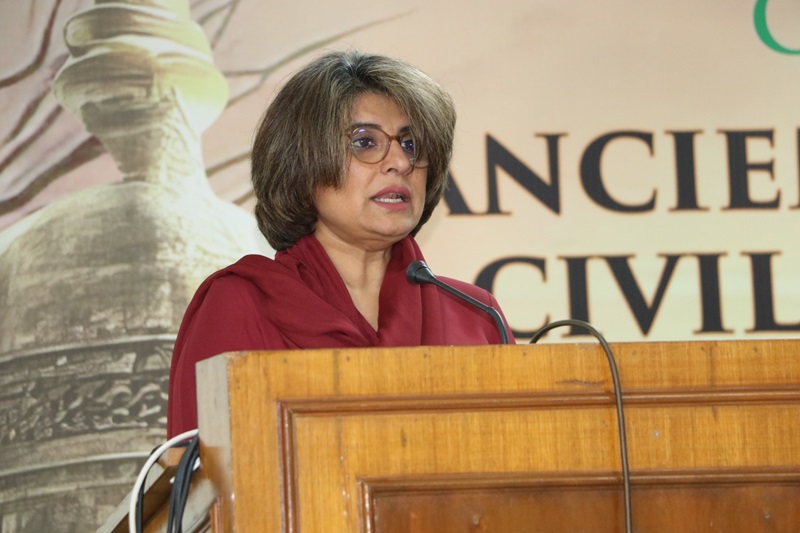
Ambassador Khalid Mahmood, Chairman BoG, ISSI,
Ambassador Sohail Mahmood, DG, ISSI,
Distinguished participants!
It is a privilege for me to join you all at the conclusion of what I reckon has been a truly productive day, full of reflection and sharing of knowledge. Concluding the One-Day International Conference on Celebrating Pakistan’s Ancient Archaeological and Civilizational Heritage, I am imbued with a deep sense of pride over the rich, multi-layered heritage that we are all heirs to.
I am sure that in the course of the conference, the participants got the opportunity to revisit the millennia exploring the treasures of our ancient civilizations, while delving into the sophisticated urban centers in Harappa and Mohenjo-Daro, which blossomed as part of the Indus Valley Civilization, and traversing the cultural and spiritual landscape of the Buddhist Gandhara, that reached its pinnacle in present-day Pakistan. These civilizations were not just wonders in their respective times; they remain a source of inspiration right into our modern age.
The three sessions of the Conference have been instrumental in addressing aspects of the Civilizational heritage from the importance, preservation and promotion perspectives. In the session on “Journeying through Pakistan’s Ancient Treasures”, the wisdom, diversity and cultural richness of these civilizations were insightfully evaluated, pointing out how this might help bring peace and mutual understanding into a world that is often at odds with itself. The presenters rightly emphasized that the values characterising these ancient societies — including innovation, resilience, and coexistence that remain relevant even today.
In the second session, effective strategies and approaches for conservation and preservation of the iconic sites — including Mohenjo-Daro, Taxila, Takht-i-Bahi, and Harappa — were discussed. It is indeed a formidable task for the custodians to protect these sites against diverse threats such as climate change, urbanization, and any form of neglect or degradation. This requires mobilising all-round efforts – from technical expertise to human and material resources to national resolve. Imbibing from international best practices and relevant expert knowledge is also of immense importance in this regard.
The final session pertaining to promotion of cultural and religious tourism was equally important. Successful tourism models across the world could be appropriately harnessed within our own context for preserving and promoting our heritage sites, while supporting engagement and economic empowerment of the local communities and offering unforgettable experiences to visitors from home and abroad. The need for data and information on tourism at the very site level in order to shape the strategy for sustainable tourism cannot be stressed enough.
My thoughts are truly captivated by the meaning and substance that is attached to the immense archaeological and civilizational heritage of Pakistan. The ancient civilizations flourishing on the lands of what is today Pakistan were not isolated entities, but an integral part of a greater tapestry creating human history and civilization. The Indus Valley Civilization, for example, was contemporary of the two other earliest cradles of civilization,the Egyptian and Mesopotamian. Similarly, Gandhara was one of the most sacred centres of Buddhist learning and culture that had a profound impact across Central Asia to East Asia. It is not our heritage alone, nor is it exclusively that of Pakistan –it is the common heritage of mankind. It remains for us to ensure, that these treasures are safe and, not just by archaeologists, academics and experts but also by our future generations and the world at large. Being the proud inheritors of this glorious legacy, we must fulfil this task with unshakeable commitment and passion.
In the context of preservation, it is rightly underlined and I would like to emphasize that sustainability must be at the core of these efforts. The need for research, tourism, and development has to be balanced with the imperative to protect these fragile relics of our past. It is, therefore, heartening that innovative approaches were discussed, from the use of cutting-edge technology in conservation to community-driven initiatives, that involve local populations in the preservation processes. Going forward, research and development in this field will require investment in the training and capacity-building of the next generation of archaeologists and heritage professionals equipping them with the tools needed for protecting our cultural assets.
Equally, Pakistan’s ancient heritage has the potential to be at the lead area of sustainable tourism. Indeed, as many countries in the world have demonstrated – from Egypt to Greece to Italy and Türkiye – tourism could become one of the strongest elements of not only job creation and economic development but also cultural diplomacy. The effort has to be thoughtful, systematic and enduring. As many of the speakers pointed out, it is the use of data and technology that will enable designing tourism models that are not just profitable but also respect the historical and cultural value of these sites and artefacts.
We should always remember that our heritage is a source of pride, identity, and unity, and that it is also fragile and requires steadfast efforts for protection and proper management. Nothing short of a whole-of-the-nation approach is imperative.
I want to express my deep thanks to the Institute of Strategic Studies Islamabad (ISSI) for this laudable initiative. I also thank all the speakers, participants, and organizers for their dedication, passion, and sustained efforts. On behalf of the Foreign Office, I reassure you all that we will continue to be both a key stakeholder and partner in safeguarding these ancient treasures and sharing them with the outside world. Our heritage is ours, and part of our distinct identity. We will jointly take care of it and ensure that it continues to inspire new generations. I thank you.
****




